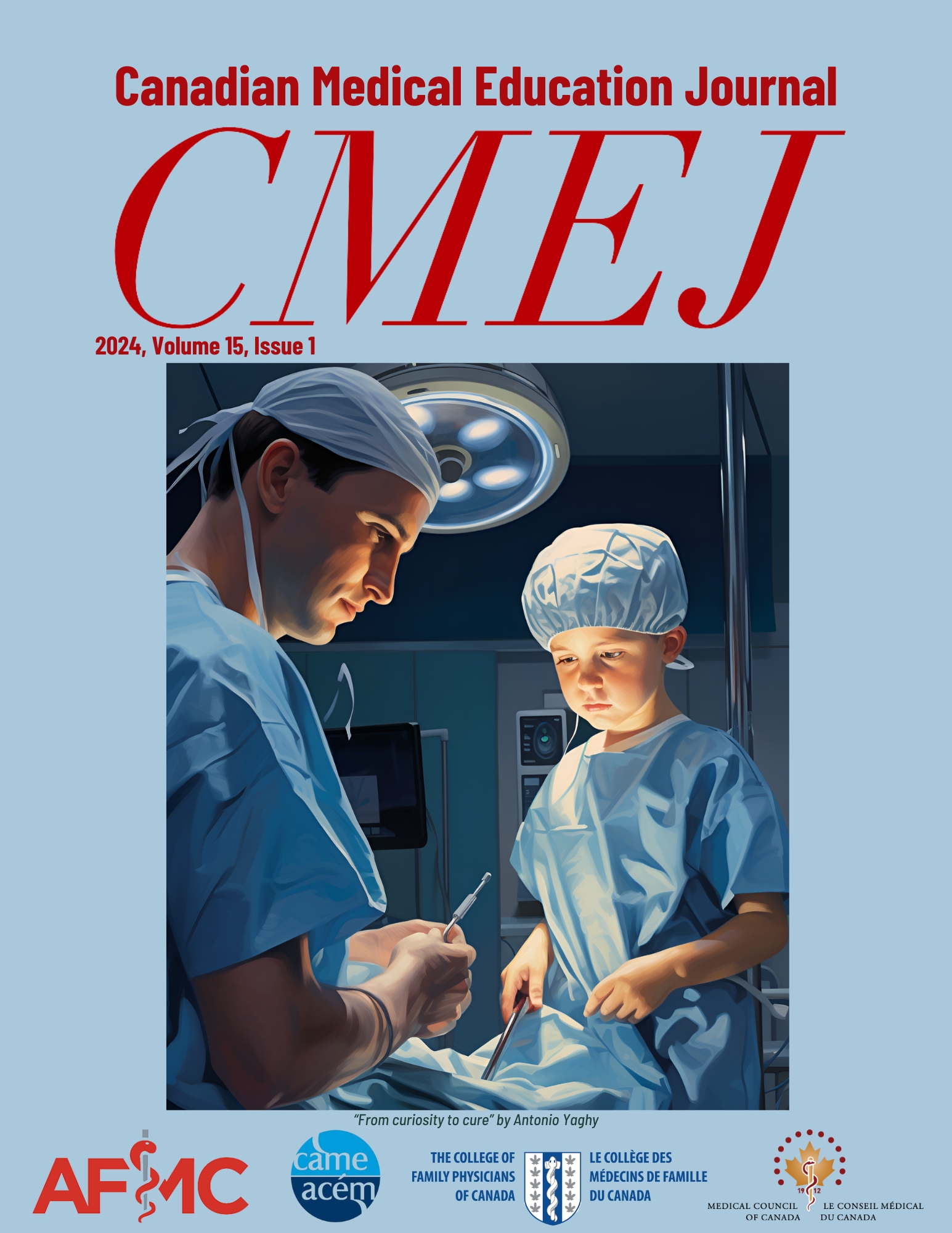Trends in ophthalmology applicants going unmatched in the Canadian Resident Matching Service
DOI:
https://doi.org/10.36834/cmej.77287Abstract
Background: Applicants to ophthalmology have high rates of going unmatched during the CaRMS process, but how this compares to other competitive or surgical specialties remains unclear. Our research aims to examine this phenomenon by identifying trends and comparing match data with other specialties, to identify disparities that may inform the need for future interventions to improve the match process for applicants.
Methods: We used a cross-sectional analysis of data provided by CaRMS on the residency match from 2013 to 2022.
Results: We obtained data from 608 ophthalmology, 5,153 surgery, and 3,092 top five (most competitive) specialty first choice applicants from 2013-2022. Ophthalmology applicants were more likely to go unmatched (18.9% [120/608]) than applicants to the top five (11.9% [371/3,092]) and surgical (13.5% [702/5,153]) specialties (p<0.001) and were twice as likely to rank no alternate disciplines (31.8%, p < 0.001) over the study period. In the first iteration, when alternate disciplines were ranked, the match rate to alternate disciplines was highest for ophthalmology applicants (0.41, p < 0.001). The majority (57.8%) of unmatched ophthalmology applicants do not participate in the second iteration.
Conclusion: Compared to other competitive specialties, first choice ophthalmology applicants were more likely to go unmatched, rank no alternate disciplines, and choose not to participate in the second iteration. Ophthalmology applicant behaviours should be further studied to help explain these study findings.
References
Ruth Wilson C, Bordman ZN. What to do about the Canadian Resident Matching Service. Can Med Assoc J. 2017 Nov 11;189(47):E1436–47. https://doi.org/10.1503/CMAJ.170791 DOI: https://doi.org/10.1503/cmaj.170791
Ryan T. Addressing bias and lack of objectivity in the Canadian resident matching process. Can Med Assoc J. 2018 Oct 9;190(40):E1211–2. https://doi.org/10.1503/CMAJ.70008 DOI: https://doi.org/10.1503/cmaj.70008
Krauss EM, Bezuhly M, Md W, Frcsc M, Williams JG. Selecting the best and brightest: a comparison of residency match processes in the United States and Canada. Plas Surg. 2015;23(4):225–30. https://doi.org/10.4172/PLASTIC-SURGERY.1000943 DOI: https://doi.org/10.1177/229255031502300410
Canadian Resident Matching Service (CaRMS). R-1 data and reports. Available from: https://www.carms.ca/data-reports/r1-data-reports/ [Accessed on Feb 25, 2023].
Mah JM, Kherani IN, Hurley B. Trends in Canadian ophthalmology residency match outcomes. Can Med Educ J. 2020 Jun 4;11(3):e67–72. https://doi.org/10.36834/CMEJ.69809 DOI: https://doi.org/10.36834/cmej.69809
Baerlocher MO, Noble J. Does sex affect the success rate of Canadian ophthalmology residency applicants? Can J Ophthamol. 2006 Apr 1;41(2):163–8. https://doi.org/10.1139/I06-003 DOI: https://doi.org/10.1139/I06-003
Warsh F. Robert Chu’s suicide sends a message medicine cannot ignore. Toronto Star. 2017 Jun 20. Available from: https://www.thestar.com/opinion/commentary/2017/06/20/robert-chus-suicide-sends-a-message-medicine-cannot-ignore.html [Accessed on Feb 25, 2023].
Bandiera G, Abrahams C, Ruetalo M, Hanson MD, Nickell L, Spadafora S. Identifying and promoting best practices in residency application and selection in a complex academic health network. Acad Med. 2015 Dec 1;90(12):1594–601. https://doi.org/10.1097/ACM.0000000000000954 DOI: https://doi.org/10.1097/ACM.0000000000000954
Canadian Federation of Medical Students. Details on CFMS supports for Match Day [Internet]. Available from: https://www.cfms.org/what-we-do/education/unmatched-support. [Accessed on Feb 25, 2023].
Zafar A, Birak C. “You feel like your world is over”: problems and solutions for medical graduates without residencies. CBC News. 2018 Apr 11. Available from: https://www.cbc.ca/news/health/medical-residents-match-1.4614534. [Accessed on Feb 25, 2023].
Dunkley J. CaRMS: the fortress between medical school and residency. 2018. Available from: https://cmajblogs.com/carms-the-fortress-between-medical-school-and-residency/. [Accessed on Feb 25, 2023].
Okoniewska B, Ladha MA, Ma IWY. Journey of candidates who were unmatched in the Canadian Residency Matching Service (CaRMS): a phenomenological study. Can Med Educ J. 2020 Jun 5;11(3):e82–91. https://doi.org/10.36834/CMEJ.69318 DOI: https://doi.org/10.36834/cmej.69318
The Association of Faculties of Medicine of Canada (AFMC). Reducing the number of unmatched Canadian medical graduates. 2018. Available from: https://www.afmc.ca/wp-content/uploads/2022/10/AFMC_reportreducingunmatchedcdnmg_EN.pdf. [Accessed on Apr 6, 2023].
Bumsted T, Schneider BN, Deiorio NM. Considerations for medical students and advisors after an unsuccessful match. Acad Med. 2017 Jul 1;92(7):918–22. https://doi.org/10.1097/ACM.0000000000001672 DOI: https://doi.org/10.1097/ACM.0000000000001672
The Association of Faculties of Medicine of Canada. Undergraduate students, electives, & MD graduates. Available from: https://www.afmc.ca/resources-data/education/undergraduate-students-electives-md-graduates/ [Accessed on Apr 7, 2023].
Nguyen AXL, Bélair ML, Clark I, et al. The Association of Faculties of Medicine of Canada Student Elective Diversification Policy: perspectives in ophthalmology. Can Med Educ J. 2022 Jan 7;13(2):101–2. https://doi.org/10.36834/CMEJ.74051 DOI: https://doi.org/10.36834/cmej.74051
Courneya CA, Cheung W, McMillan MJ. High dives and parallel plans: relationships between medical student elective strategies and residency match outcomes. Can Med Educ J. 2020 Aug 4;11(3):e4. https://doi.org/10.36834/cmej.53018 DOI: https://doi.org/10.36834/cmej.53018
Downloads
Published
Issue
Section
License
Copyright (c) 2023 Mostafa Bondok, Mohamed S Bondok, Christine Law, Nawaaz Nathoo, Karim F Damji

This work is licensed under a Creative Commons Attribution-NonCommercial-NoDerivatives 4.0 International License.
Submission of an original manuscript to the Canadian Medical Education Journal will be taken to mean that it represents original work not previously published, that it is not being considered elsewhere for publication. If accepted for publication, it will be published online and it will not be published elsewhere in the same form, for commercial purposes, in any language, without the consent of the publisher.
Authors who publish in the Canadian Medical Education Journal agree to release their articles under the Creative Commons Attribution-Noncommercial-No Derivative Works 4.0 Canada Licence. This licence allows anyone to copy and distribute the article for non-commercial purposes provided that appropriate attribution is given. For details of the rights an author grants users of their work, please see the licence summary and the full licence.











